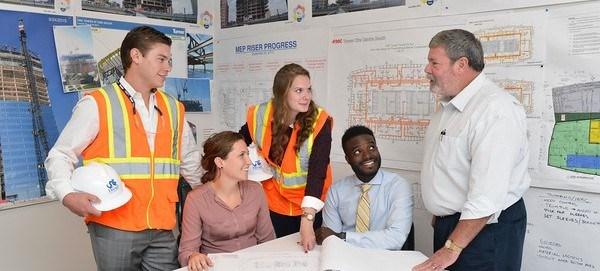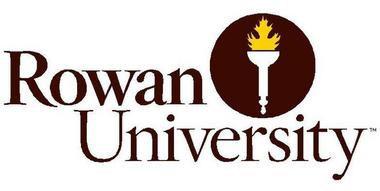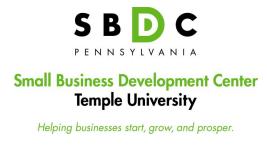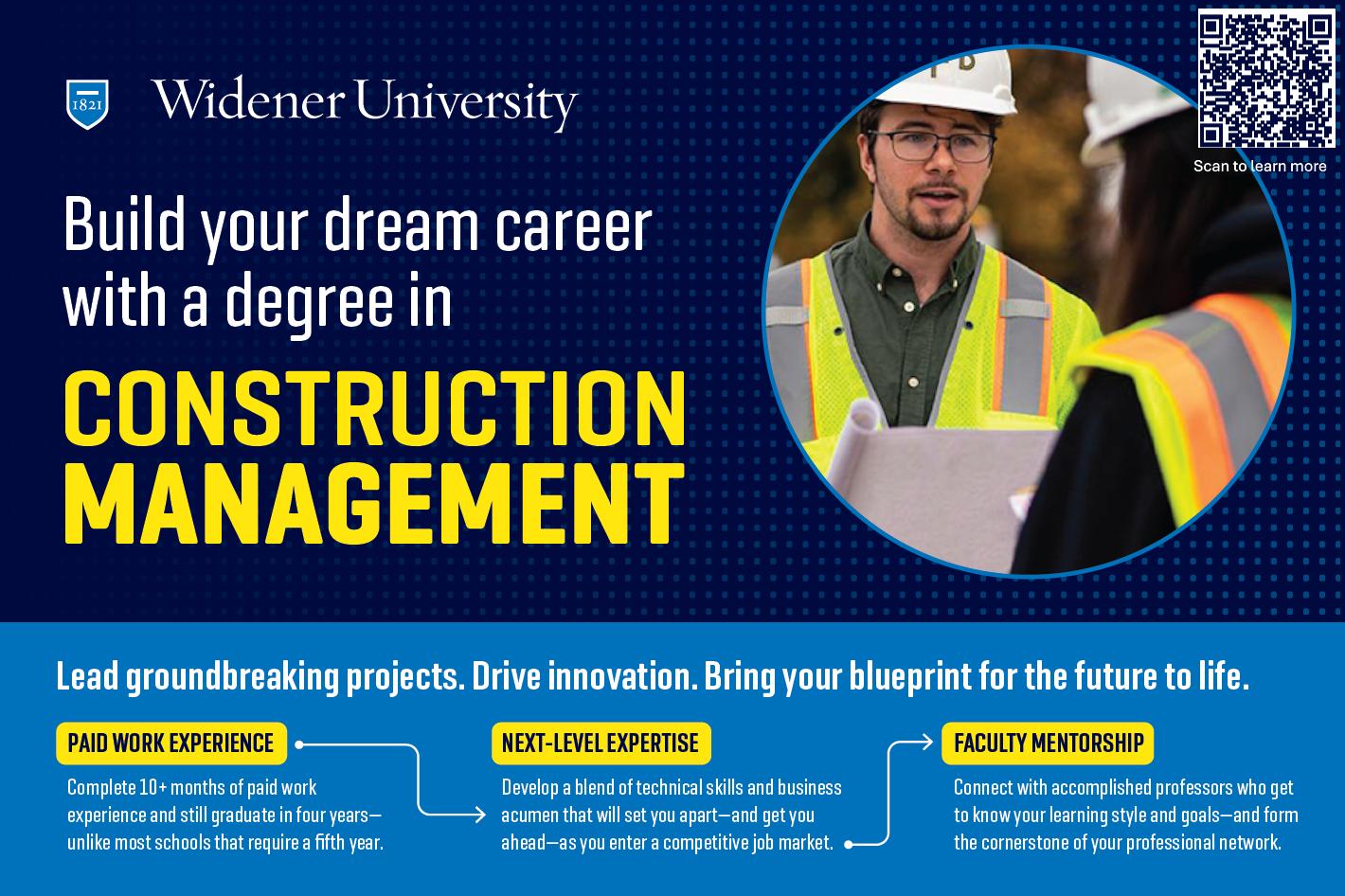Community College of Philadelphia
ADC 253 Environmental Systems I
An overview of environmental control systems used in modern buildings, focusing on mechanical, electrical, and plumbing systems. Students will gain a basic understanding of foundation in these systems and their design. Through application and practice, students will learn the interrelationships between systems and approaches to integrating them into building design and construction.
Prerequisite: ADC 101 and ADC 103 or ADC 109
ADC 254 Environmental Systems II
Components and systems used to control the environment of modern buildings are studied, expanding student’s knowledge of Mechanical, Electrical, and Plumbing (MEP) systems. Specialized building systems are also studied, including fire protection, vertical systems, signaling, and communication. Additionally, students will gain an understanding of specialized topics related to sustainability, including alternatives to traditional MEP systems. Students will become prepared for the LEED Green Associate Examination.
Prerequisite: ADC 101 and ADC 103 or ADC 109
ADC 261 Construction Management and Scheduling
This course is a thorough survey of the construction project management process from initial conception to completion. Topics include feasibility analysis, siting/staging issues, software application, personnel management, contractual procedures, and job-site safety. Students will be introduced to basic contractor operations, project administration, job planning, and Critical Path Method scheduling. After building a conceptual base, students will apply their scheduling knowledge to simulated projects. In this latter phase of the course, students will use the most current and prevalent project planning software.
Prerequisite: ADC 246
ADC 286 Building Rehabilitation and Energy Retrofit
This course will examine three integrally related topics: 1) the re-development process by which existing building stock is rehabilitated, 2) construction issues specific to the rehabilitation of existing buildings and 3) energy retrofit, which includes sustainability and related strategies. ADC 286 will introduce students to a broad array of tools, including construction management techniques and methods, energy audits and retrofits, as well as public and private financing options and project management relative to building rehabilitation for both small and large scale projects, especially in urban neighborhoods.
Prerequisite: ADC 101
• REGISTRATION: Students who have never taken a class at CCP must apply to be a student and should identify themselves as a “guest” student. Contact David Bertram, dbertram@ccp.edu and copy Ariel Vazquez, avazquez@ccp.edu with questions. Students who have taken classes here before can register online.
• All of the courses listed above are undergraduate and would count towards the 63 credits needed to receive an Associate degree in Applied Science from the Community College of Philadelphia. Courses also count when transferring to most four-year colleges or universities.
• Carpenters JAC graduates are awarded 18 credits towards CCP’s AAS in Construction upon graduation from their apprenticeship program. Contact David Bertram for more information on this at dbertram@ccp.edu.
Not all courses are offered in the Fall Semester.
CONTACT
Dr. Heidi Gurdo, Ed.D.
Department Chair
David LaFazia, Ed.D. Instructional Coordinator
CONSTRUCTION MANAGEMENT
GENERAL INFORMATION
Associate in Applied Science (AAS) in Construction Management 60 credits (19 courses; 18 required plus 1 elective)
Phone: 302-454-3188
Email: hgurdo@dtcc.edu
Phone: 302-453-3099
Email: dlafazia@dtcc.edu
The Construction Management program blends foundational principles with practical co-op experience to equip students with essential skills for entry-level positions in construction management. The program integrates civil and architectural knowledge to broaden the scope of construction management opportunities.
COURSE INFORMATION
COURSE NO. COURSE TITLE
CMT 110 Construction Materials and Print Reading
This course offers a comprehensive introduction to interpreting and communicating information from residential and commercial Architecture, Engineering, and Construction (AEC) documents. Students will learn to accurately calculate dimensions, areas, and volumes from drawings while gaining an understanding of essential construction materials and sustainable building practices. Hands-on laboratory activities provide practical experience with material properties and applications. Professional conduct, ethical responsibilities, and safety practices in the construction industry are emphasized throughout the course.
Credits: 3
Prerequisite: SSC 100 or concurrent Course Modalities: Classroom course
CMT 120 Residential Cost Estimating
This course introduces students to the fundamental principles of construction cost estimating and project planning. Students will interpret residential construction documents, take off material quantities, and estimate labor and equipment costs. They will explore methods of estimating costs and scheduling using industry-standard tools and software.
Prerequisite: MAT 183, CMT 110
Course Modalities: Classroom course, hybrid course, and online course
CMT 130 OSHA Safety Training and Workplace Readiness
This course offers comprehensive information on Occupational Safety and Health Administration (OSHA) compliance issues, including the recognition, avoidance, abatement, and prevention of safety and health hazards in the workplace. In addition to these vital safety topics, the course emphasizes workplace readiness by guiding students in developing effective resumes and preparing for the required co-op class. Students will gain skills necessary to navigate the job market successfully, understand workers’ rights, and recognize employer responsibilities, equipping them to promote a culture of safety and professionalism in their future careers.
Prerequisite: SSC 100 or concurrent Course Modalities: Classroom course
CMT 220 Advanced Cost Estimating/Planning
This course provides an in-depth analysis of commercial construction costs, bid preparation and value engineering with regard to budgetary constraints. Different methods of estimating using productivity software are presented.
Credits: 3
Prerequisite: CMT 120 and ENG 101
Course Modalities: Classroom course
CMT 240 Construction Project Management I
This course develops an understanding of project management using productivity software. Primary topics include an introduction to job organization and coordination, project scheduling, critical path method (CPM) scheduling techniques, materials management, cost estimates, and reporting.
Credits: 3
Prerequisite: CMT 120 and (ENG 102 or higher) Course Modalities: Classroom course
CMT 200 Co-op Work Experience
This cooperative work experience (co-op) course enables students to integrate practical work experience with the knowledge and skills acquired throughout the Construction Management program. During the experience, students develop personal, professional, and academic competencies as they refine technical skills, explore career options, build confidence, expand their professional networks, and prepare for a successful transition into the workforce.
Credits: 4
Prerequisite: CMT 110 and CMT 130
Course Modalities: Classroom course, hybrid course, and online course
CMT 260 Construction Project Management II
This course further develops an understanding of project management using productivity software. Primary topics include job organization and coordination, project scheduling, critical path method (CPM) scheduling techniques, materials management, cost estimates, and reporting. Emphasis is placed on commercial construction contracts, including planning, scheduling, controlling, and analyzing project progress.
Credits: 4
Prerequisite: CMT 220 and CMT 240
Course Modalities: Classroom course
CET 125 Civil & Environmental Drafting & Design
This course introduces drawing and design problems encountered in civil and environmental engineering. Topics include site analysis, site layout, grading and drainage, utility layout and profiles, erosion control, and sustainable site design. Students design and develop a conceptual commercial site design and produce elements of the drawing set.
Credits: 3
Prerequisite: ENG 101 or concurrent, MAT 183 or concurrent
Course Modalities: Classroom course
CET 144 Surveying Principles
This course examines theory and practice of plane surveying, including the use of tapes, levels, transits, and theodolites. Problems in triangulation, traverses, mapping, computation of areas, proper field procedures, and field book entries are covered.
Credits: 4
Prerequisite: CET 125, MAT 183, ENG 101
Course Modalities: Classroom course, hybrid course
AET 160 Architectural CAD Applications
This course introduces three-dimensional (3D) parametric architectural computer-aided design (CAD) software to develop building models used to produce drawing documents, including site plans, floor plans, elevations, sections, and schedules. Topics include the creation of 3D pictorial representations of interiors and exteriors, including materials, lighting, rendering, and animation. It is recommended that students acquire a Windows computer capable of running Autodesk Revit.
Credits: 3
Prerequisite: CMT 110
Course Modalities: Classroom course, hybrid course, online course
AET 210 Building Service Systems
This course introduces students to the principles of sustainable building design and building service systems. Emphasis is placed on understanding energy flows, building loads, and the impact of climate conditions on design decisions. Students will explore both passive and active systems that enhance energy efficiency, reduce resource consumption, and support environmental sustainability. Through hands-on analysis, students will interpret heating, ventilation, air conditioning (HVAC), electrical, plumbing, and fire suppression drawings, applying concepts that contribute to sustainable building design.
Credits: 3
Prerequisite: ENG 101, MAT 183, CMT 110
AET 260 Contracts and Specifications
This course presents principles, procedures and processes related to construction documents and project delivery with an emphasis on construction specification writing that incorporates the standards of the Construction Specifications Institute (CSI) Masterformat.
Credits: 3
Prerequisite: (ENG 102 or concurrent) and CMT 110
Course Modalities: Classroom course, online course
OAT 152 Excel
This course provides a comprehensive examination of spreadsheet skills, building from essential concepts to more advanced applications. This course develops technical expertise and strengthen problem-solving abilities through hands-on, project-based learning. The course emphasizes leveraging spreadsheet software to analyze and present data to support informed decision-making.
Credits: 3
Prerequisite: SSC 100 or concurrent Course Modalities: Classroom course, online course
BUS 101 Introduction to Business
This course introduces fundamental business concepts, including money management, organizational structures, entrepreneurship and small business ownership, management principles, marketing strategies, and the role of accounting and finance. This course will enhance financial literacy, explore various forms of business ownership, and examine leadership and decision-making in business. The course provides a foundation for understanding core business functions and navigating diverse business environments.
Credits: 3
Prerequisite: SSC 100 or concurrent Course Modalities: Classroom course, online course
Admission / Registration
Click or scan to view guidance on admission to Delaware Tech and registering for courses.
FINANCIAL RESOURCES
Delaware Tech is committed to providing you with an affordable, quality education that will prepare you for success in the workplace or transfer to a four-year institution to continue your education. And while we have one of the lowest tuition rates in the region, we know many students will require additional financial assistance to achieve their academic goals. There are a number of resources available to you based on your unique needs such as federal grants, loans, and work study; state programs like the SEED Scholarship program and Delaware Aid for Needy Students; and private scholarships.
CONNECTED DEGREES
The Construction Management (CM) program has six program-to-program transfer agreements (also called articulation agreements) that connect the Delaware Tech Construction Management associate degree program with baccalaureate programs to create smooth transfer opportunities.
Construction Management Program College of Engineering 3175 JFK Boulevard Philadelphia, PA 19104
CONTACT
Xi Wang PhD, PE, LEED GA
Program Director
Construction Management Program, College of Engineering
Drexel University
Phone: (215) 895-0925
Email: xw389@drexel.edu
UNDERGRADUATE DEGREE PROGRAMS
COURSE INFORMATION
COURSE NO. COURSE TITLE
CMGT 101 Intro to Construction Mgmt.
This course will introduce the basic history and management concepts of the construction industry to students with the expectation that upon completion students will have an overview of the industry. Career choices, industry firms, and key players in the Construction Management process will be explored.
CMGT 161 Building Materials & Constr. Methods I
This course is designed to explore the range of building materials in use today and their interrelationships in a construction project. Topics will include a study of the major components of construction materials, the selection process, specification, alternatives, procurement, placement and quality management for the building systems covered. Foundations, excavations, wood framing and steel construction, and the role these materials play in the success of a project once chosen will be considered and evaluated.
CMGT 162 Building Materials & Constr. Methods II
Continues CMGT 161. Covers concrete, reinforced concrete, site cast and pre-cast concrete, brick and concrete masonry, reinforced masonry, and properties of these materials & construction methods associated with them.
CMGT 163 Building Materials & Constr. Methods III
Continues CMGT 162. Covers roofing systems, glass, glazing, windows, doors, cladding systems, interior finishes, the properties of these materials and construction methods associated with each of them.
CMGT 240 Economic Planning for Construction
Covers techniques for economic decision making for building and infrastructure construction topics. Topics include cash flow, present worth analysis, equivalent annual worth, rate of return, risk analysis, and benefit/cost analysis.
CMGT 261 Construction Safety
Covers OSHA liability, general safety, hazard communication, fire, material handling, tools, welding, electricity, scaffolding, fall protection, cranes, heavy equipment, excavation, concrete, ladders and stairways, confined space entry, personal protective equipment, and health hazards. Course approved by the OSHA Training Institute.
CMGT 262 Building Codes
Familiarizes students with the content of the BOCA International Building Code (emphasizing the non-structural provisions), the purpose and intent of code requirements, and how to apply the code to structures and occupancies. Examines how the code is used as a tool in design and construction and prepares students for the advent of a single model building code planned for the nation.
CMGT 263 Understanding Construction Drawings
This course examines a variety of construction documents, including drawings, details, graphic standards, sections, and quantities for competitive bidding, and execution of projects. Both residential and commercial construction documents will be examined.
CMGT 265 Information Technologies in Construction
The objective of this course is to expose students to a large variety of information technologies in construction and to discuss the impact of these technologies on work environments, processes, and work quality. Students will investigate a variety of issues surrounding IT in construction including implementation, standards, integration, knowledge management and the underlying technology.
CMGT 266 Building Systems I
This course covers construction management and design concepts relating to heating, ventilation, and air conditioning systems, and the integration of these systems into the building design and construction process.
CMGT 267 Building Systems II
Continues CMGT 266. This course covers construction management concepts relating to electrical systems, wiring, lighting, signal and data systems, and transportation systems and the integration of these into the building design and construction process.
CMGT 355 Introduction to Sustainability in Construction
An overview of the design and construction of high performance buildings. Students will gain topical familiarity with the wide range of issues related to sustainable design and construction. The USGBC’s green building certification program will be covered in detail. Both historical and contemporary case studies will be utilized.
CMGT 361 Contracts & Specifications I
Analyzes construction contracts, specifications, and practices with regard to business law and liability. Required for construction management students. Elective for others.
CMGT 362 Contracts & Specifications II
Continues CMGT 361. Examines contractor, architect, and engineer responsibilities through case studies and class discussions.
CMGT 363 Estimating I
Covers discussion of the estimating function and review and applications of material quantity survey techniques used in estimating costs of construction projects. Includes types of approximate and precise methods of estimating and their uses, and computer applications.
CMGT 364 Estimating II
Covers pricing and bidding of construction work including cost factors, labor and equipment, productivity factors, prices databases, job direct and indirect costs, methods of estimating time, materials, equipment, subcontractors’ work, general expenses, and profit, bid preparations and submission, and computer applications.
CMGT 365 Soil Mechanics in Construction
Gives an overview of the types of problems encountered in geotechnical construction. Subjects covered will be composition, groundwater fundamentals, settlement and consolidation, stability of earth slopes, types of foundations, and behavior of difficult soils.
CMGT 371 Structural Aspects in Construction I
The first of a two course series is designed specifically for construction management majors. The sequence addresses the interactions of different kinds of loads with common structural elements and design considerations for typical construction materials. This course places emphasis on the design of wood framed construction.
CMGT 372 Structural Aspects in Construction II
The second part in a two-course sequence for Construction Management majors. The course places emphasis on the design and analysis of concrete and steel frame construction.
CMGT 375 Building Information Modeling in Construction
This course is intended to provide students with a hands-on introduction to Building Information Modeling (BIM) in Construction. Emphasis will be placed on the use of BIM to support current construction activities such as design review, coordination, scheduling, logistics, estimating, and project close-out. Topics will include an introduction to 3D BIM modeling, 3D coordination and clash detection, 4D visual scheduling and logistics, 5D estimating, and BIM for Facility Management. Students will learn the fundamentals of the most widely used software applications in the construction industry: SketchUp, Revit and Navisworks.
CMGT 385 Selling and Negotiation Techniques in Construction
Applies negotiation and marketing principles to the construction industry. Includes understanding the roles of market research, business development planning, negotiation and networking techniques. Students will acquire the skills and techniques to prepare a winning presentation and negotiations.
CMGT 450 Management of Field Operations
This course is intended to equip students with knowledge and skills required to successfully manage and support construction field operations. Knowledge areas include contract administration, project engineering, site superintendence, and other topics critical to field operations.
CMGT 451 Heavy Construction Principles & Practices
This course is intended to provide students an introduction to the principles and practices employed in heavy construction. The course content is presented from a practical perspective focusing on actual field applications.
CMGT
461 Construction Management
Covers construction management concepts and practices, the management system, construction planning and programming, project control, environmental management, total quality management, and ethics in construction management.
CMGT 463 Value Engineering
Covers the value concept, value engineering job plan, and techniques of project selection.
CMGT 467 Techniques of Project Control
This course covers construction planning, scheduling, network systems, and communications required for project control, diagram logic, and Earned Value Analysis.
CMGT 468 Real Estate
Overview of the development process including site selection, residential densities, market analysis and cash flow analysis.
CMGT 469 Construction Seminar: Contemporary Issues
This course is intended to prepare students for professional practice through a survey of the current and future state of the industry.
CMGT 470 Productivity in Construction
Explores the evaluation of construction management’s effectiveness. Overview of techniques required for improvement of construction field efficiency including quality management, productivity measurements, method improvement, human factors, and communications.
CMGT 485 Habits of Successful Design and Build Construction
The course develops specific and essential skills necessary for success within the construction workforce and project environments. Students will learn to convert virtues to habits for life and career success in the challenges of the construction industry. Strategic skills in planning and scheduling, information handling, critical event completion, problem solving, negotiating, and team-building techniques crucial to the construction process will be analyzed and developed.
CMGT 486 Leading in the Construction Industry
Leadership fundamentals for Constructors. Investigation of self mastery to include behavioral profiles and emotional intelligence quotients to establish a baseline for skill development and personal growth required in the construction industry. Engagement in team building and communication models. Examination of leadership traits and skills through analysis of theory and comparison of construction industry leaders.
CMGT 491 Senior Capstone I
First component of a three-part capstone series. It is the initial problem proposal phase. Students meet with clients and establish project goals, budget, and timeline. Emphasis on proposal writing, defining customer needs, and effective presentation skills.
CMGT 492 Senior Capstone II
Continues CMGT 491. This course requires preparation of options and alternative solutions to the problem defined in the proposal phase. It requires a written and oral progress report.
CMGT 493 Senior Capstone III
Continues CMGT 492. Requires presentation of alternative solutions to client representatives in both oral and written reports.
CMGT I499 Construction Management Independent Study Project
Self-directed within the area of study requiring intermittent consultation with a designated instructor.
UNDERGRADUATE CERTIFICATE PROGRAMS
The undergraduate certificates in Construction Management are designed to fill the training needs of industry leaders. Developed at the request of two contractors’ associations — the General Building Contractors Association and the Contractors Association of Eastern Pennsylvania — the certificates are suitable for those who have undergraduate degrees in other fields but wish to work in the construction industry. The certificate program is also suitable for individuals already employed in the industry and seeking career advancement or updated training.
The 18-credit Construction Management certificates include the major-specific classes that can be applied to the B.S. in Construction Management or simply be used toward the standalone certificates.
CERTIFICATE OPTIONS:
FUNDAMENTALS OF CONSTRUCTION MANAGEMENT
(18.0 quarter credits)
The Certificate introduces students to the basic concepts of the construction industry.
REQUIREMENTS
CMGT 101 Introduction to Construction Management
CMGT 161 Building Materials and Construction Methods I
CMGT 162 Building Materials and Construction Methods II
CMGT 163 Building Materials and Construction Methods III
CMGT 261 Construction Safety
CMGT 263 Understanding Construction Drawings
CONSTRUCTION SCIENCE
(18.0 quarter credits)
This certificate focuses on introducing students to design concepts relating to heating, ventilation, and air conditioning systems and the integration of these systems into the construction process. In addition, the certificate also covers the process of estimating as well as building codes involved in construction projects.
ADMISSION REQUIREMENTS
Successful completion of Fundamentals of Construction Management
REQUIREMENTS
CMGT 266 Building Systems I
CMGT 267 Building Systems II
CMGT 363 Estimating I
CMGT 364 Estimating II
Select two of the following:
CMGT 240 Economic Planning for Construction
CMGT 262 Building Codes
CMGT 265 Information Technologies in Construction
CONSTRUCTION MANAGEMENT CONCEPTS
(19.0 quarter credits)
This certificate focuses on construction contracts, specifications, and practices with regard to business law and liability. The certificate also covers value engineering and construction planning, scheduling, network systems, as well as the communications required for project control and claims prevention.
ADMISSION REQUIREMENTS
Successful completion of the Fundamentals of Construction Management Certificate and the Construction Science Certificate.
REQUIREMENTS
CMGT 361 Contracts And Specifications I
CMGT 362 Contracts and Specifications II
CMGT 385 [WI] Selling and Negotiation Techniques in Construction
CMGT 461 Construction Project & Company Management
CMGT 463 Value Engineering
CMGT 467 Techniques of Project Control
Fundamentals of Construction Management Certificate
Construction Science Certificate
MS IN CONSTRUCTION MANAGEMENT*
CONSTRUCTION MANAGEMENT MASTER’S DEGREE (45 QUARTER CREDITS)
CMGT
501
Leadership in Construction
This course is intended to introduce students to value-based, effective leadership principles and practices across the construction industry. Topics include prevailing theory, leadership traits & styles, emotional intelligence, motivation, collaborative environs and alliances, and change.
CMGT
505
Construction Accounting and Financial Management
This course presents the principles of accounting for construction projects. Topics include techniques of cost accounting and financial analysis employed by the construction practitioners. Specific topics include accounting principles to track and manage labor, material, equipment, overhead and other construction resources. Topics specific to construction include contract revenue, financial reporting, and tax considerations for constructors.
CMGT 510 Construction Control Techniques
This course addresses the knowledge and skill sets required to successfully plan and control complex construction projects. Topics include procurement and contracts, pre-bid planning, contract budgets and cash flow, and planning case studies.
CMGT 512
Cost Estimating and Bidding Strategies
This is an advanced course in construction estimating addressing competitive bidding strategies. Topics include profit objectives, analyzing the competition, and determining optimum combo of price, cost and volume.
CMGT 515
Risk Management in Construction
This course presents risk management techniques and practices specific to construction projects. Students will gain an understanding of the risks stemming from technical and business sources related to the construction process, and to identify, quantify, and develop the appropriate response strategies.
CMGT 525 Applied Construction Project Management
This course presents the knowledge and skills required to successfully manage complex construction projects. Topics include the project management hard skills such as estimating and budgeting, time management, and planning.
CMGT 528 Construction Contract Administration
This course introduces the managerial and legal aspects of construction contract administration. The student is introduced to basic concepts of contract law employed in construction and the rules of interpretation. Topics include changes and change orders, disputes, differing site conditions, and defective documents.
CMGT
530
Equipment Applications and Economy
This course provides an in-depth treatment of heavy construction equipment applications and covers the associated management practices. The application topics include techniques used to analyze and estimate equipment productivity, equipment selection, and optimization. The course includes a strong emphasis in equipment economics including owning and operating costs.
CMGT 532
International Construction Practices
This course provides an introduction to the strategic issues relating to the business of construction on a global scale. The course is intended to provide students with the knowledge of current best practices by construction organizations in America, Europe and Asia.
CMGT 535 Community Impact Analysis
This course provides an overview of community impact assessment, including the benefits of conducting such an assessment. It also provides general guidelines for conducting a community impact assessment, including types of impacts that should be addressed during the process and related issues.
CMGT 538 Strategic Management in Construction
This course presents concepts in strategic management within construction organizations. Topics include clients/ constructors/competencies, portfolio management, and marketing strategies for construction firms.
CMGT 540 Schedule Impact Analysis
This is an advanced course that deals with the legal aspects of construction schedules. Topics include time impact analysis, applying CPM techniques to contract claims, and calculating delay damages.
CMGT 545 Sustainable Principles & Practices
CMGT 546 Sustainable Technologies
This course addresses sustainable technologies in the built environment and is presented as a whole building design system. The course is organized into three major categories-Design Guidance, Project Management, and Operations & Maintenance.
CMGT 547 LEED Concepts
This course addresses the fundamental concepts and practices underlying the LEED green building rating system.
CMGT 548 Quality Management and Construction Performance
This course covers quality management of construction processes. Topics include designing and implementing quality management plans, establishing a quality management system and Information technology in quality management.
CMGT 550 Productivity Analysis and Improvement
The focus of this course is construction productivity measurement and improvement. Topics include roles of the individual stakeholders, quantifying labor and equipment productivity, and techniques to improve job site productivity.
CMGT 558 Community Sustainability
This course provides clear direction to students how to design cities and developments that are sustainable and reduce environmental harm.
CMGT 696 Capstone Project in Construction Management I
The capstone project is completed independently over two quarters under the direction of full-time Construction Management faculty and is intended to reinforce the knowledge and skills acquired through graduate study.
CMGT 697 Capstone Project in Construction Management II
The capstone project is completed independently over two quarters under the direction of full-time Construction Management faculty and is intended to reinforce the knowledge and skills acquired through graduate study.
CMGT T580 Special Topics in Construction Management
Topics decided upon by faculty will vary within the area of study.
GRADUATE CERTIFICATE
CONSTRUCTION MANAGEMENT GRADUATE CERTIFICATE (18 QUARTER CREDITS)
CMGT 510 Construction Control Techniques
This course addresses the knowledge and skill sets required to successfully plan and control complex construction projects. Topics include procurement and contracts, pre-bid planning, contract budgets and cash flow, and planning case studies.
CMGT 512 Cost Estimating & Bidding Strategies
This is an advanced course in construction estimating addressing competitive bidding strategies. Topics include profit objectives, analyzing the competition, and determining optimum combo of price, cost and volume.
CMGT 515 Risk Management in Construction
This course presents risk management techniques and practices specific to construction projects. Students will gain an understanding of the risks stemming from technical and business sources related to the construction process, and to identify, quantify, and develop the appropriate response strategies.
CMGT 525 Applied Construction Project Management
This course presents the knowledge and skills required to successfully manage complex construction projects. Topics include the project management hard skills such as estimating and budgeting, time management, and planning.
CMGT 528 Construction Contract Administration
This course introduces the managerial and legal aspects of construction contract administration. The student is introduced to basic concepts of contract law employed in construction and the rules of interpretation. Topics include changes and change orders, disputes, differing site conditions, and defective documents.
CMGT 538 Strategic Management in Construction
This course presents concepts in strategic management within construction organizations. Topics include clients/ constructors/competencies, portfolio management, and marketing strategies for construction firms.
Admission/Registration:
• If a student wishes to pursue a Bachelor’s degree or undergraduate certificates in Construction Management as a full-time, part-time or transfer student they must apply for admission into Drexel University. For information on how to apply for undergraduate studies at Drexel, please visit http://www.drexel.edu/undergrad/ or call 215-895-2400. Once accepted into Drexel and the Construction Management program, students will be assigned an academic advisor that will help them with registration.
• For students who are not seeking a degree (non-matriculated) and want to take classes, they should contact the Goodwin College at 215-895-2162 or via email at goodwin@drexel.edu
• Students wishing to pursue the online graduate certificate or the Master’s in Construction Management must apply to Drexel University as well. For more information on how to apply for the fully online graduate certificates and Master’s in Construction Management, please visit http://online.drexel.edu/. GBCA members must enter their organization’s affiliation code GBCA on their application to qualify for their tuition reduction. Once accepted and admitted in the program, students may contact the program’s academic advisor for help with registration.
• The B.S. in Construction Management at Drexel University is a 187 credit degree program. The M.S. in Construction Management at Drexel University is a 45-credit degree program consisting of a required sixcourse core curriculum (18 credits), seven elective courses in an area of concentration (24 credits), and a two part capstone course (6 credits). We also have a graduate certificate in: Construction Management (18 credits). Classes dates and times are subject to change. Questions can be directed via email to Dr. Xi Wang at xw389@ drexel.edu or William Grogan at wtg25@drexel.edu
Build a career with Drexel’s Construction Management Degree and Certificate Programs
Whether online or face-to face, experience the Drexel difference. Courses are taught by faculty using practice-based curriculum from years of field experience to prepare students for impactful careers administering complex construction and engineering projects.
Department of Continuing Education, Innovation
Rydal Executive Plaza
1095 Rydal Road
Jenkintown, PA 19046
CONTACT
Randy Ingbritsen Interim Regional Lead (Abington, Great Valley)
Phone: 215-881-7405
Email: rxi3@psu.edu
PROJECT MANAGEMENT CERTIFICATE PROGRAM
The Project Management Certificate Program is a structured sequence of courses that prepare students for careers in the planning and business fields. Throughout this program, students will be able to apply project management practices such as project initiation, planning and scheduling, project cost management, and project risk management. Upon completion of the certificate program, students will have earned 84 Professional Development Units (PDUs) that they can put towards achieving the Project Management Professional (PMP) credential through the Project Management Institute.
COURSE NO. COURSE TITLE
PJMGT 5000 Project Initiation & Planning
COURSE OBJECTIVE: Students are introduced to the project management process; the role of the Project Manager; project communications, and project leadership. This course begins the planning process covering topics such as the objectives, scope, and success criteria.
PJMGT 5001A Project Scheduling & Integration
COURSE OBJECTIVE: This course continues to build upon the lessons learned in “Project Initiation and Planning”. Content covers the work breakdown structure, project schedule, PERT/GANTT/CPM methods, and project integration. This is the second of four courses required for the Certificate in Project Management.
Prerequisite: Project Initiation and Planning (PJMGT 5000)
PJMGT 5002 Project Costing & Control
COURSE OBJECTIVE: To understand the cost estimating techniques, earned value analysis, change management, and lessons learned. Specific course objectives include: Understanding the project management discipline; Creating a cost estimate and cost baseline; Addressing project changes; Project reporting; Conducting lessons learned.
Prerequisite: Project Scheduling and Integration (PJMGT 5001A)
PJMGT 5003 Project Risk and Management
COURSE OBJECTIVE: To understand the related project management risks, creating a risk register, and to understand how to manage a project. Specific course objectives include: Understanding the project management discipline; Risk identification; Qualitative and quantitative risk analysis; Project management skills; Ethics in project management.
Prerequisite: Project Costing and Control (PJMGT 5002)
SIX SIGMA BLACK BELT
Lean Six Sigma is a business analytic approach for continuous improvement that optimizes performance through the reduction and elimination of variance and waste. Our four-module Six Sigma Black Belt Certification course blends classroom experience with hands-on activities to provide skills that can be applied immediately. The four modules include: Theory and Application; Continuous Process Improvement; Statistical Quality Process Control; and Enterprise Driven.
BUSAD 5569: Six Sigma Black Belt
PMI, PMP®, and the PMBOK® Guide are registered marks of the Project Management Institute.
Penn State Abington
Science, Technology, Engineering & Math
Rowan College at Burlington County 900 College Circle, Mount Laurel, NJ 08054
CONTACT
John W. Petrosino, MSc Prog. Coord. Construction Management
COURSE NO. COURSE TITLE
BUA-205 Legal Environment of Business
Phone: (856) 242-5833
Email: STEM@rcbc.edu
This course is an introduction to legal principles and procedures. It includes an introduction to business law, ethics, crimes, torts, contracts, the uniform commercial code, sales, product liability and consumer protection.
CON-101 Bldg. Materials & Construction Methods I
This introductory course provides an understanding of the fundamentals of residential and commercial construction materials and practices. Students gain an understanding of the types of construction, structural design requirements, and the properties of common construction materials such as wood, concrete, iron, and steel.
CON-102 Bldg. Materials & Construction Methods II
This course is a second level course covering the advanced topics of building materials and construction methods in residential and commercial construction applications. Building on the competencies of CON 101, students will continue to develop their knowledge base of the most common building materials in use and their interrelationship in a construction project.
CON-202 Understanding Construction Drawings
This course is an introductory course covering the fundamentals of interpreting construction drawings. Students will learn how to examine a variety of construction documents, including drawings, details, graphic standards, sections, and quantities for competitive bidding of projects.
EGR-110 Design Computer Graphics I
This course covers beginning to intermediate AutoCAD with emphasis on the AutoCAD language over drafting principles. All projects use AutoCAD software.
Rowan College at Burlington County
TEC-120 Safety Management
This course provides an overview of fundamentals of Safety Management Principles. A detailed review of OSHA regulations and standards pertinent to engineers and managers that expect to perform and/or influence safety related activities in an engineering construction project. Minimum safety requirements are discussed in a practical context for immediate application in engineering construction field operations. Course material include a review of OSHA Standards for the Engineering Construction Industry, a review of selected sections of OSHA Standards for General Industry, a review of general principles of Engineering construction safety management. Furthermore, at the end of the course, eligible students receive an OSHA “30 Hour Training Certificate in Occupational Safety and Health for Construction.”
TEC-212 Project Management
The course covers key components of project management including project integration, project scope management, project time and cost management, quality management, human resource considerations, communications, risk management, and procurement management.
EGR-203 Surveying
This basic course will teach the use of the level, transit, tape, linear measurements, leveling contours, traverses, and construction surveying will be demonstrated. Field and office work, site planning and computerized traverses will be studied.
SST-100 Principles of Sustainability
This course is designed to provide the fundamentals of sustainability principles and practices for entry-level students as well as under- and unemployed adults who are in job transition from non-environmental sectors seeking grounding in sustainability principles. It covers basic sustainability principles relative to population issues, climate change, renewable energy, consumption, ecosystem threats, transportation, green design and construction, biodiversity and environmental justice. Throughout the course, emphasis is placed on assisting students in exploring green employment opportunities.
TEC-101 Career Readiness I
This course is part of a 3-part sequence of career exploration courses. This initial course provides a career exploration introduction. Students will perform personal and career assessments, and develop job search and interviewing skills. The course is geared toward students with limited professional/career experience in their field of interest or studies.
Rowan College at Burlington County
TEC-201 Career Readiness II
This course is part of a 3-part sequence of career exploration courses. In this course the students continue with the Career exploration series and they will take a deeper dive into career preparation by applying many of the concepts they learned in the series by connecting with professional industries through mentors, site visits, and observations. A total of 120 hours of practicum experience is required during this course. The course is geared toward students with some professional/career experience in their field of interest or studies.
TEC-202 Career Readiness III
This course is part of a 3-part sequence of career exploration courses. The series culminates with this course where students will demonstrate their knowledge of possible career paths by immersing themselves in their career interests either through research or work experience. A total of 120 hours of either work experience or field study is required during this course. The course is geared toward students with extensive professional/career experience in their field of interests or studies.
TEC-211 Entrepreneurship
The course provides students with a solid foundation of the vital role played by entrepreneurs and entrepreneurship in the 21st century global economy. They will assess, explore, critique, and celebrate the intriguing processes of entrepreneurship. The emphasis is on entrepreneurship as a manageable process that can be applied in virtually any organizational setting. Moreover, the course focuses on the creation of new ventures, their development process, and factors associated with their success. Further, the course covers theory and practice, with the applications of principles, concepts and frameworks to real world situations.
REGISTRATION
Students who have never taken a class at RCBC must first apply to be a student. Contact Academic Advising at advising@rcbc.edu or (856) 222-9311, ext. 1559, with questions or concerns. Students who have previously taken classes at RCBC can register via Self-Service.
All the courses listed above are undergraduate courses that count toward the 60 credits required to complete the Associate Degree in Construction Management, as well as the corresponding 3+1 Programs needed to receive a Bachelor’s Degree in Construction Management at Rowan University. These credits also count when transferring to some four-year colleges or universities.
Rowan College at Burlington County
CONTACT
Alejandro Rodriguez, D.Eng. PMP, LEED AP, CDT
Associate Professor
Genesis Lopez Admissions
Global Learning & Partnerships
201 Mullica Hill Road Glassboro, NJ 08028
Phone: 856-256-5137
Email: rodriguezale@rowan.edu
Phone: (856) 266-3034
Email: lopezg@rowan.edu
COURSE NO. COURSE TITLE
CM 01301 Fundamentals of the Construction Industry I
This course provides a general overview of the planning, administration, management, and cost of construction projects and an introduction to the methodology used in executing specific designs. Emphasis is placed on the organization of construction firms, use and types of primary construction equipment, estimating and quantity takeoffs, contractual and management systems, scheduling, project administration, and inspection of construction operations.
CM 01302 Fundamentals of the Construction Industry II
Students will be introduced to the design process and development of construction documents. It covers the standard design phases: programming, conceptual design, schematic design, design development, construction documents and construction administration, and the format and utilization of project manuals including contract specifications, the interpretation and analysis of engineering plans and specifications, and the new technologies being used in the design including Building Informational Modeling (BIM) and sustainable (green) practices. The course also explores the various common project delivery methods.
CM 01303 Project Building Systems
Students will learn the description and identification of the equipment and materials used in mechanical systems for heating, ventilating and air conditioning, electrical, plumbing, fire protection, piping, gas, lighting, water and waste water, conveyance, life safety systems, environmental, security, audio/visual, and building system controls. The course also provides an introduction to building structural and envelopes systems.
CM 01304 Project Administration
This course provides exposure to and use of various types of projects control systems for project efficiency and documentation. Students will learn how the submittal process operates and is monitored. They will also be shown a variety of tools used in tracking project documentation, and essential elements related to contract law and administration.
CM 01305 Construction Cost Accounting, Estimating & Finance
Introduction to various costs of construction including direct and indirect project costs, comparison of hard and soft costs, job cost analysis and forecasting of cost to completion, labor, material and equipment expenses, cash flow, overhead, profitability, and general conditions costs. Students will learn research techniques used to create accurate estimating and bidding procedures.
CM 01306 Construction Project Planning & Scheduling
Students will learn procedures used in project planning and scheduling that employ float methods of scheduling logic. They will examine the critical path series of activities of project completion, including the use of computer software applications for problem solving, and related tools, spreadsheets, and information management. Also covered are work breakdown structures, activity durations, status reports, resource allocation, re-planning, monitoring, and updating of projects. Students will develop projects site logistics plans.
CM 01407 Advanced Leadership & Communication
This course is designed to teach students to become more effective leaders and communicators in the construction industry. Drawing on various case studies, students will examine ethical practices in the industry. They will define and role-play effective communications strategies that simulate situations they may encounter within the industry such as general-to-subcontractor, corporate, and labor relations. Students in this course will also examine principles of negotiation and dispute resolution in the construction industry.
CM 01408 Industrial Relations in the Construction Industry
This course examines various perspectives (union, management, government) on the collective bargaining system in place in the construction industry. Topics include the legal and regulatory environment, problem solving, and the roles of labor and corporations.
CM 01409 Building Energy Systems for Construction Managers
The Building Energy Systems for Construction Managers course provides a conceptual understanding of functions and performances of energy systems including mechanical, electrical, electronic, and plumbing and transport systems in residential and commercial buildings. The course also provides information on integration between energy systems and other building components. While introducing the concepts of alternative energy sources, energy efficiency, structural implications of mechanical systems, indoor air quality, and environmental control strategies, the course familiarizes students with more recent and current efforts in sustainability and green building ideas. The course also introduces codes and standards relevant to energy devices used in building construction, such as National Fire Protection Association (NFPA), American Society of Heating, Refrigerating and Air-Conditioning Engineers (ASHRAE), and National Electrical Code (NEC).
CM 01410 Building Construction Systems & Codes
This course provides a conceptual understanding of functions and performance of structural building systems. The primary purpose of this course is to provide familiarity with use of construction code with reference to International Building Codes (IBC) 2012. For anyone in the field of construction or construction management, it is necessary to know about the concepts and fundamental aspects of the code. As a result, the course is intended to provide an understanding of how the code was developed, how it is to be interpreted, and how it is applied to design and construction of buildings, the goal of the course is to make implementation of the code easier, and clearer to understand. Other than discussions on structural elements and their construction methods, the course covers issues such as use and occupancy, types of construction, fire-resistive constructions, interior finishes, building material, inspections, and tests.
CM 01411 Construction Safety and Loss Prevention
This course offers a practical guide for eliminating safety and health hazards from construction worksites. The Handbook of OSHA Construction Safety and Health addressed the occupational safety and health issues faced by those working in the construction industry. The course covers a vast range of issues including program development, safety and health program implementation, intervention, and prevention of construction incidents, regulatory hazards faced by those working in the construction industry and sources of information. The course also features updates for construction regulations, construction job audit, training requirements, and OSHA regulations. It includes new record keeping guidelines and forms with additional material on focused inspections. Containing updated contact information for the newest agencies, the course also presents a model safety and health program, examples of accident analysis and prevention approaches.
CM 01412 Capstone Course
In the course, students will build on what they have learned in the major, integrating the theory and knowledge that they gained in class with practical experience in the construction industry. Capstone projects are developed through a series of project meetings between the student and program faculty, with significant written deliverables.
REGISTRATION
Please reach out to Alejandro Rodriguez for questions regarding the application process at 856266-3034 o rodriguezale@rowan.edu
Rowan University’s Online B.A. in Construction Management is a degree program that provides 36 of the remaining credits necessary to complete a 120 credit bachelor’s degree. In addition to transfers from other accredited colleges and universities, credit toward the degree may be awarded for apprenticeships and prior work experience.
NEW
Graduates of the Carpenters JAC may be awarded up to 35 credits upon completion of their apprenticeship program. Contact Academic Advisory Carlos Parker for more information at parkerc@rowan.edu.
Discounted Rate for North America’s Building Trades Union Members Program ranked #3 Nationally by College Choice & bestvalueschools.com.
MASTER OF ENGINEERING MANAGEMENT (M.E.M.)
The Master of Engineering Management (M.E.M.) is designed for engineers to develop management and leadership skills. Students in this program receive knowledge of managerial basics such as organizational behavior and teamwork, quantitative decision making, and operational system design. The combination of courses from Rowan’s Henry M. Rowan College of Engineering and the Rohrer College of Business, provide an effective balance of innovative technical knowledge and managerial skills required to understand both the engineering and business aspects of technology. The M.E.M. program is online and designed for working professionals to conveniently attend class and complete their engineering management career goals in five consecutive semesters.
Program Requirements
The M.E.M. Program requires 30 semester credit hours (SCH) of graduate-level coursework. Six (6) courses must be taken from the required M.E.M. classes listed below. In addition, students must complete four (4) electives, which are grouped in tracks.
This course covers a variety of topics in engineering economics including the following: making economics decisions, equivalence and the time value of money, spreadsheets and economic analysis, present worth and equivalent annual worth, internal rate of return, benefit cost ratios and breakeven analysis, replacement analysis, depreciation and income taxes, inflation, value engineering, and decision-making tools.
This course deals with a range of topics related to risk management including the following: risk terminology, tools for quantitative analysis of environmental and technological risks, social risk issues, risk in modern life, statistical analysis, data presentation, dose-response models for carcinogens, model limitations, models of risk aversion, psychological and community perceptions of risk, risk communication, environmental and health risk issues in the media, and case studies of accidents and incidents.
This course covers a range of topics related to quality in engineering management including the following: concepts and philosophy of engineering quality management, leading engineers, data analysis, engineering quality assurance and results, engineering quality methods and tools, continuous process improvement, total quality management within engineering, six-sigma, quality costs, customer satisfaction in relation to engineering design and quality, vendor relationships and quality, benchmarking engineering practices and products, statistical process control, quality function development, and case studies of quality in engineering management.
This course covers the following topics related to engineering decision making: mathematical decision tree equations, mathematical programming for optimization of engineering problems, the theory behind methods and models, advanced statistical models for engineering analysis, advanced linear and non-linear models for engineering analysis, practical applications of decision methods and models to engineering problems, and identifying and balancing risk associated with technology development. Case studies dealing with real engineering projects and problems are included.
This course covers the following topics related to construction management: project managers, developers, designers, contractors, and subcontractors; project startup, construction, and closeout; project financing; control of costs and schedule; construction contract types, bidding, delivery methods, and changes; bonds and insurance; inspection of work; claims, disputes, and arbitration; and case studies in construction management.
This course deals with the following topics in construction scheduling: scheduling terminology and history; time and duration of activities; relationships between project activities; critical path method (CPM); program evaluation and review technique (PERT); delays and other constraints; schedule development, analysis, and updating; and case studies of project construction schedules.
This course covers a wide variety of topics related to cost engineering including the following: measuring work progress using costs, manhours, and schedule; earned value; cost and schedule performance; productivity; quantity adjusted budgets; budget and schedule baselines; control account baselines; cost control versus financial control; analysis, trending, and forecasting; cost and schedule performance curves; index and other tracking; elements of complete cost; and case studies in cost engineering.
This course introduces students to law and ethics as it applies to engineering and engineering management. Topics covered in the area of law include the following: legal responsibilities of owners, designers, and contractors: risk management via insurance, surety bonds, and contracts; legal implications of the common activities of design professionals; liens; expert testimony; and patent law. Topics covered in the area of ethics include the following: ethical codes of professionals; derivation of ethical structures; and the role of the engineer in assuring public safety, health, and welfare. Case studies dealing with law and ethics are included.
Prerequisite: Enrollment in Master of Engineering Management Program or Master of Science in Engineering Management Program
The topics covered in this course include the general characteristics and types of facilities: management functions within a facility and their differences compared with general management; inventory, procurement, operations, and real estate management; maintenance management and planning, preventive and schedule maintenance, and contract management; energy management and energy devices, electricity, lighting, water, heating, HVAC, and efficient and intelligent buildings; safety and environmental management, OSHA, RCRA, air quality, clean air act, and other EPA requirements; emission control and fleet management; and transport equipment, elevators, escalators, moving walkways, and device operation and maintenance. In this course, all aspects of managerial and planning concepts are covered, as well as maintenance and engineering know-how that are relevant to and needed for the study of facilities management.
Prerequisite: Enrollment in Master of Engineering Management Program or Master of Science in Engineering Management Program
This course teaches engineering management students the art of systems engineering. Engineering management students will learn systems engineering processes and skills to integrate user needs, manage requirements, conduct technological evaluation, and build elaborate system architectures. Engineering management students will also learn to assess risk and establish financial and schedule constraints. The course devotes particular attention to knowledge, skills, mindset, and leadership qualities needed for an engineering manager to operate effectively in the area of systems engineering.
The course deals with the development of engineering estimates for civil engineering projects and project components including labor, materials and equipment. Total project costs including direct and indirect costs, field and home-office costs, and contingency are covered. Also covered are the various types of civil engineering estimates including piles and cofferdams, wellpoints and earthdrilling, water and sewer systems, road and highway pavements, concrete buildings and bridges, and steel buildings and bridges. The course includes appropriate computer applications.
In this course, students will learn the Project Management Body of Knowledge (PMBOK) as put forward by the professional association, the Project Management Institute (PMI). Students will not only study the various phases and documents of project management, they will also have experience creating each of the documents for a given project.
Teamwork is increasingly important to engineering success. In this course, students will learn how to foster the development of effective of teams, using diversity management, integrative bargaining, career management, and other methods.
Prerequisite: Admission to the Master of Engineering Management Program
Technical skills are necessary but insufficient for success in engineering management. It is also necessary for engineering managers to be effective motivators and leaders. In this course, students will also learn optimal techniques of hiring and rewarding engineers.
Department of Civil & Environmental Engineering, 1947 N. 12th Street Philadelphia, PA 19122
CONTACT
Denise Guiteras Administrative Specialist Civil and Environmental Engineering Department
Phone: (215) 204-7814
Email: denise.guiteras@temple.edu

























































